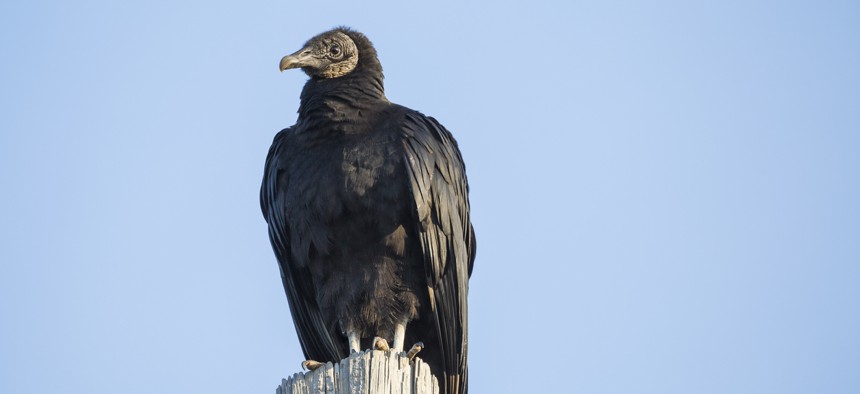Vultures Descend on Small Town—and Won't Leave

istockphoto.com/WilliamSherman
For nearly a year, officials in Bunn, in northeastern North Carolina, have tried to deter dozens of buzzards from roosting on local buildings. Even propane cannon aren't working.
Last December, officials with the small North Carolina town of Bunn posted a public notice on Facebook: they’d be firing a propane cannon at the local high school in regular intervals for two weeks.
The reason? Vultures.
“An automated propane cannon will be temporarily installed on the roof of the gymnasium of Bunn High School,” the town, with a population of around 400, said in the post, since removed from the site. “They will be programming the cannon to fire in the morning, afternoon and evening when vultures are likely to be roosting.”
The large birds had been congregating in town, officials said, though no one was sure why. Cannon blasts—roughly 130 decibels each, similar to the sound of a gunshot—are often used to clear wildlife and aren’t harmful to animals, and the scheduled booms did deter the birds, for a while.
“It seems,” Bunn Police Chief Steve Massey told the Raleigh News & Observer, “they’re back.”
North Carolina is home to two species of the bird: the turkey vulture and the black vulture. Turkey vultures are more common, according to an online guide to North Carolina birds, but black vultures can also be found in each of the state’s 100 counties, with denser populations in the east. Both are federally protected species, meaning it’s illegal to move or harass them, though permits can be obtained to attempt to relocate them if they’re endangering livestock, according to the U.S. Fish and Wildlife Service.
Both are birds of prey that dine mostly on carrion (a more-palatable term for, let’s say, dead things), though black vultures will occasionally sample a young live animal as well, according to the National Audubon Society. Their consumption of dead animals helps prevent the spread of disease, but the birds are large and have several strange behaviors—vomiting when startled, cooling off by peeing and pooping on their own legs—that leave people wary of their presence.
No one is sure why the vultures are congregating in Bunn, nor do they know how to deter them. Most recently, Massey told town officials that he would more strictly enforce trash regulations in an attempt to limit sources of food for the birds, the News & Observer said.
That tactic may prove useful, but only if the birds are black vultures, which routinely pick through garbage to find edible scraps, according to the National Audubon Society.
Kate Elizabeth Queram is a senior reporter for Route Fifty and is based in Washington, D.C.
NEXT STORY: OSHA to States: Protect Workers from Covid-19 or Forfeit Authority





